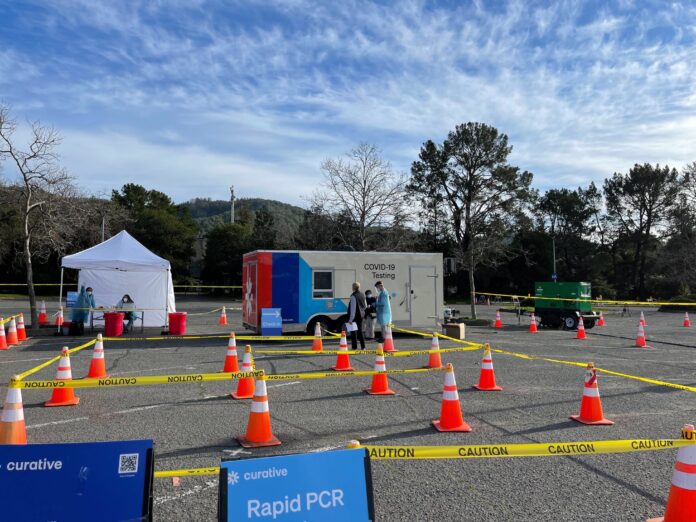When the Covid pandemic first hit Los Angeles County, one of the unexpected silver linings was that it greatly expanded the area’s biological testing industry.
Companies that had already been in the genetic or disease testing business quickly pivoted to Covid testing and reaped significant new revenue — none more so than Temple City-based Fulgent Genetics Inc., whose annual revenue shot up 32-fold in two years to just shy of $1 billion thanks to Covid testing demand.
Other testing companies that had just launched quickly realized the Covid-19 pandemic was a chance to get on the map right out of the starting gate. Among them were Windsor Square-based BiologyWorks Inc., San Dimas-based Curative Labs Inc. and Venice-based Sameday Technologies Inc.
Certainly, all of these companies emerged or achieved spectacular success here in part because of the county’s huge population of 10 million, the largest in the nation. Several of these companies — most notably Fulgent and Curative — were able to scale up at lighting speed, spurred on by massive public agency contracts intended to meet the population-
driven Covid testing demand.
But other companies, such as BiologyWorks and Rancho Dominguez-based DxTerity Inc. found unusual niches, such as testing employees of film studios or going after international markets.
Diagnostic roots
One local biotech industry expert traced L.A.’s evolution as a Covid testing hub back more than 50 years to the establishment of diagnostics labs and research in the county.
“Los Angeles historically had strength in diagnostics going all the way back to the formation of Beckman Instruments (now Beckman Coulter, which is part of Washington D.C.-based Danaher Corp.) out of Caltech in 1935,” said Ahmed Enany, chief executive of Westwood-based Southern California Biomedical Council, an industry trade association. “As the market for diagnostics expanded after World War II, local entrepreneurs … created companies to provide reagents, diagnostics test products, instrumentations and other related testing products supplied to both clinical and research laboratories,” he added.
This trend generated a significant talent pool in Southern California for medical diagnostic testing companies — and today, Covid testing companies — to draw upon.
“The current generation of diagnostics companies that responded to Covid builds on that entrepreneurial strength but uses newer molecular and immunological techniques to diagnose Covid infections,” Enany added.
In addition to that industrious history, the region has several other attributes that have helped Covid testing companies get off the ground or pivot to detection of the coronavirus. These attributes include a base of established corporate leaders and academic institutions, strong startup and venture communities, and a commitment from Los Angeles County officials to ensure adequate availability of resources for bioscience companies, according to Taylor McPartland, chief executive of Palms-based incubator ScaleHealth Inc.
What’s after Covid?
The major question confronting all of these companies — indeed, the entire Covid testing industry — is how they will adapt once the demand for Covid testing begins to subside. This question may have less urgency now than it did a year ago, when the prevailing wisdom was that vaccines would in short order extinguish the coronavirus that causes Covid. Now, there’s widespread expectation that Covid will be around for decades to come, and so will the need for some level of Covid testing. But once the demand for Covid testing slackens, companies that now derive the vast majority of their revenue from Covid testing, such as Fulgent or Curative, will need to find other sources of revenue.
“As the demand for Covid diagnostics decelerates, I am sure that all those who have platform technologies under development to diagnose other health conditions can pivot back,” Enany said. “They are now armed with more knowledge about how and why their probes work, experience in meeting FDA regulatory requirements and proof-of-market traction.”
DxTerity Diagnostics Inc.
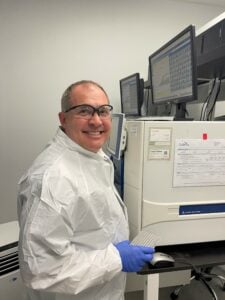
FOUNDED: 2006
HEADQUARTERS: Rancho Dominguez
BUSINESS: Genomic testing company that pivoted to Covid testing, assembling Covid testing kits, mostly for businesses that do Covid testing in the workplace
CEO: Bob Terbrueggen
EMPLOYEES: 60
REVENUE: More than $50 million
TEST VOLUME: DxTerity processed about 700,000 Covid tests in 2021.
DxTerity Diagnostics Inc. began in 2006 with a federally certified lab developing tests that pharmaceutical companies could use to help identify which drugs perform best for patients. When the pandemic hit, DxTerity pivoted to Covid-19 tests, focusing on workplace testing. “That started with our own company and the need to keep our own people working,” Chief Executive Bob Terbrueggen said. DxTerity’s saliva test could be taken at home and then was sent into the company’s Pasadena lab for PCR analysis. Employers were notified within 48 hours about which workers had tested positive and had to quarantine before returning to work. Demand for DxTerity’s tests was so great that the company had to expand its lab four times last year. The company also expanded its test kit assembly manufacturing capacity. In recent months, DxTerity’s former pharmaceutical company clients have resumed placing orders for other types of tests, Terbrueggen said, which could bode well for the company as the demand for Covid testing plateaus or subsides.
BiologyWorks Inc.
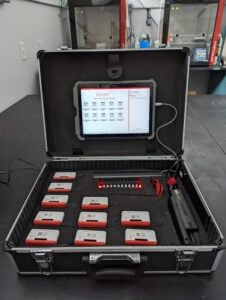
FOUNDED: 2019
HEADQUARTERS: Windsor Square
BUSINESS: Focused on Covid testing for underserved populations outside the U.S.
CEO: Hunt Ramsbottom
EMPLOYEES: About 40
FUNDING TO DATE: About $20 million
TEST VOLUME: The company produces between 5,000 and 10,000 tests per day at a manufacturing plant in Poland.
BiologyWorks Inc. was founded just months before the pandemic began, having acquired technology from the Alfred Mann Foundation for home testing for influenza. Once the Covid-19 pandemic hit, the company pivoted to Covid testing. But instead of rushing into the domestic testing market as most companies were doing, BiologyWorks opted to focus on underserved international markets. “It’s where 96% of the world’s population lives,” Chief Executive Hunt Ramsbottom said. What set, Ramsbottom said, was the company’s test kit with an analyzer built in. This allowed test results to be generated on the spot. The company first sought to enter the European market, contracting with an existing test kit manufacturer in Poland and seeking permission from six European Union countries to distribute their test kits. The company is also preparing to use another third-party manufacturer in Malaysia for its test kits. Next up, Ramsbottom said, the company is seeking entry into several African nations.
Applied BioCode Inc.
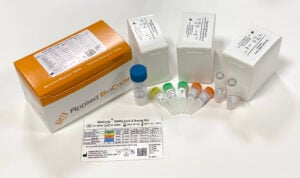
FOUNDED: 2008
HEADQUARTERS: Santa Fe Springs
BUSINESS: Manufacturer of instrumentation and test kits for Covid and other disease and genetic testing laboratories
CEO: Winston Ho
EMPLOYEES: 90
REVENUE: Between $10 million and $15 million (2021)
NOTABLE: Applied BioCode takes its name from the bar code it developed that can identify several genetic markers simultaneously in a blood sample.
Applied BioCode Inc. was founded in 2008 by Winston Ho, a scientist, researcher and executive with expertise in sensor systems. Ho developed a miniaturized bar code that could identify several genetic markers simultaneously in a blood sample. The bar codes were applied to two main uses: identifying up to 17 pathogens in gastrointestinal blood assays and up to 20 pathogens in respiratory blood assays. Prior to the pandemic, Applied BioCode sold its bar code-based test kit component for use in hospital laboratories and at pharmaceutical companies. When Covid hit, the company pivoted to Covid tests, getting FDA Emergency Use Authorization to sell its bar code-based components to testing companies such as Fulgent and Sameday Health. The company went public about two years ago, with its stock traded on the Taiwan stock exchange. Ho said the company’s current market value is equivalent to about $150 million. Once Covid testing demand subsides, Ho said the company plans to return to its pre-pandemic focus on a customer base of hospital laboratories and pharmaceutical companies.
Curative LABS Inc.
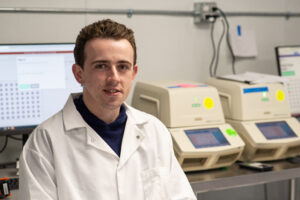
FOUNDED: 2020
HEADQUARTERS: San Dimas
BUSINESS: Large-scale provider of Covid PCR, antigen and molecular tests using third-party test kits
CEO: Fred Turner
EMPLOYEES: 3,000, including contract workers
NOTABLE: Last year, Curative also administered Covid vaccinations, getting shots in the arms of more than 2 million people before returning exclusively to its Covid testing business.
Three years ago, Fred Turner, Isaac Turner (no relation) and Vlad Slepnev were working together at San Jose-based Shield Bio, a clinical laboratory specializing in infectious disease testing. Shortly after that company folded in January 2020, the trio formed Curative Labs Inc. and quickly developed a Covid test using an oral swab (instead of the long nasal swabs then in use), found a lab in San Dimas willing to take them on, and obtained $8 million in venture capital funding. By April of 2020, the fledgling company had secured major test contracts with the city of Los Angeles and the U.S. Army, and it had also secured emergency use authorization from the FDA. The company’s test kit technology and its focus on oral swabs allowed it to quickly scale up; it now operates more than 17,000 sites across 18 states and three federally certified labs. But the rapid growth also came with controversy: Last year, the FDA issued an alert that one of the third-party test kits Curative was using could yield false results, and in July — at the company’s request — revoked the emergency-use authorization. Curative switched to other test kit providers. Looking ahead, by the end of this year, Curative plans to use its testing facility network to provide a “full-service health care offering,” though the company declined to elaborate.
Sameday Technologies Inc., dba Sameday Health
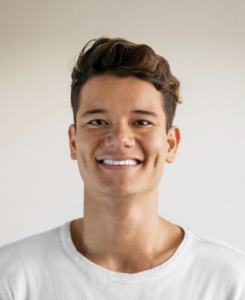
FOUNDED: 2020
HEADQUARTERS: Venice
BUSINESS: Operates Covid testing clinics in 14 states, including major metro areas such as Los Angeles; New York City; Atlanta; Miami; and Washington, D.C. Most clinics have on-site labs to analyze the Covid tests.
CEO: Felix Huettenbach
EMPLOYEES: More than 1,200
NOTABLE: Sameday Health offers several types of Covid tests, including the PCR analysis as well as antigen and antibody tests. The company provided tests for fans attending Super Bowl LVI at SoFi Stadium in Inglewood.
With Covid-19 cases soaring and reliable testing services greatly lacking in the early phases of the pandemic, biotech industry veterans Felix Huettenbach and Max Oehme co-founded Sameday Technologies Inc. in September 2020 to provide quick, accessible Covid testing. They relied on their connections to a federally certified lab to analyze the test samples within 24 hours, reducing the uncertainty time for people getting the tests. Sameday Health’s first clinic was in Venice; the company has since opened 40 more clinics in 14 states. Through last November, Sameday Health administered more than 1.5 million Covid tests. Late last summer, the company launched a house-call service, in which nurses go to people’s homes to collect test samples, thereby getting around people’s fears of — or inability to get to — public testing centers. The company has also branched out from Covid testing, offering STD testing, intravenous drip services, basic telemedicine and other personalized health services.
Fulgent Genetics Inc.
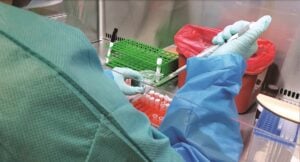
FOUNDED: 2011
HEADQUARTERS: Temple City
BUSINESS: Testing for Covid-19 and genetic tests for other diseases
CEO: Ming Hsieh
EMPLOYEES: 700
MARKET CAP: $1.905 billion
REVENUE: $992.6 million (2021)
NET INCOME: $507.4 million (2021)
TEST VOLUME: Fulgent delivered about 10 million billable tests in 2021, more than double the 4.4 million tests delivered in 2020 and 170 times the 58,573 billable tests delivered in 2019.
Just two years ago, Fulgent Genetics Inc. was a small but promising genetic testing company with $32 million in revenue for all of 2019 and had just launched a home-based genetic testing product. Today, Fulgent is a testing juggernaut with 2021 revenue of $992.5 million. That huge 32-fold leap in revenue was almost entirely due to demand for the company’s Covid testing services. During the first months of the pandemic, Fulgent aggressively sought public agency contracts for mass Covid testing programs — it quickly became the largest Covid testing provider for Los Angeles County, for example. Last year, to meet rapidly increasing demand, Fulgent opened a major new lab in Houston capable of processing more than 20,000 tests per day. During the fourth quarter, Fulgent’s testing revenue appeared to plateau, leaving some to wonder if the Covid test boom could be ending. In anticipation of that, Fulgent has also expanded genetic testing for other uses, such as identifying various types of cancers.
